
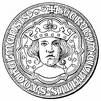












1150 On Feb. 8 Conrad III and his eldest legitimate son (with 2nd wife Gertrude von Sulzbach) Henry (VI) Berengar defeat Welf VI and his son Welf VII at the Battle of Flochberg, then Henry Berengar dies later in the year, throwing the succession open. On Nov. 21 king (since 1134) Garcia VI Ramirez the Restorer (b. 1112) dies, and his son Sancho VI Garces (the Wise) (1132-94) becomes king of Navarre (until June 27, 1194), dropping the name Pamplona and going on to fight off Castile and Aragon and bring Navarre into the political orbit of Europe. Matilda (Maud) (daughter of English King Henry I) and her red-haired hubby Count Geoffrey V of Anjou (1113-51) of W France (who likes to wear a yellow flowered sprig of the soulful broom plant Planta genista in his cap, earning him the lucky-with-chicks surname Plantagenet) cede Normandy to their short, freckled, red-haired, energetic son Duke Henry (future Henry II), who returns from Scotland; it had previously been acquired by Henry I in right of Matilda. The kingdom of Aragon unites with the county of Barcelona. Eric IX (the Saint) (1120-60) becomes king of Sweden. Albert the Bear (1100-70) inherits Brandenburg in E Germany from its last Wendish prince, and becomes Margrave Albert I, becoming the mark's first capable ruler, working to subdue and Christianize the Slavs and colonize Brandenburg with German settlers. Sultan Alauddin Husain (-1173) of Ghor (S of Herat) goes E and destroys the city of Ghazna (Ghazni) in the Kabul Valley W of the Khyber Pass, founding the Ghurid Dynasty in the mts. of C Afghanistan (until 1215), whose rulers are ever fondly looking over the Khyber Pass towards luscious Punjab and Delhi. Saxon Germans from the Moselle region settle in the Zips and S Transylvania regions of Hungary after being called in to help defend the frontiers against the Poles and Byzantines; meanwhile Pechenegs and Szeklers are also called in to settle along the frontier for protection. About this time the Germans revive their trade on the Rhine, setting up shop in Cologne, Dortmund, Soest and Munster by 1250. The Golden Age of Buddhist Art in Burma begins in this decade. In this half-cent. speakers of French begin dropping final consonants. In this half-cent. Trouvere music in Provence, S France becomes organized; Jongleurs (wandering minstrels) popularize Fabliaux (Fablieaux), short (less than 400 lines) bawdy comic tales in octo-syllabic verse (ancestor of the modern short story), while romantic knight types prefer the sack in the hay, er, Breton Lay. In this decade Austrian nobleman (from Linz?) Der Von Kurenberg (Kürenberg), the first famous German Minnesinger (Ger. "loving recollection") lyric poet-singer flourishes; others in this cent. (usually minor aristocrats) incl. Dietmar von Aist (-1171), Friedrich von Hausen (1150-90), and Walther von der Vogelweide (1170-1230). After 50 years of Crusading, in this half-cent. Muslim texts on ancient Greek philosophers and scientists begin to arouse interest in Europe, and within a cent. they are getting serious and shifting into high gear; meanwhile Caliph Mustanjid of Baghdad orders all the philosophical works of Avicenna and the Brethren of Sincerity burned, and by 1200 speculative thought is kaput in the Muslim World. The Moors conquer Merida (Mérida), Spain, giving rise to the myth of the Seven Cities of Gold, about seven bishops fleeing to keep the Muslims from obtaining their holy relics, and reaching distant lands, where they found the cities of Cibola and Quivira; really based on an 8th cent. Portuguese legend about Antilla Island?; after the New World is discovered in 1492, guess what they think, later fastening on New Mexico. David I of Scotland and his son Earl Henry found Cistercian abbeys in Kinloss in Moray, and Holmcultram in Cumberland. Bologna U. in Italy is founded. Paris U. is founded to study theology and philosophy. In this decade Mongol rulers begin to support Buddhism. The Pueblo II Period (begun 950) ends, and the Pueblo III Period begins in SW North Am. (ends 1300); until the early 17th cent. Indians begin using lava flow deposits in New Mexico as a winter-warm art gallery, producing over 10K drawings, later preserved as Petroglyphs Nat. Nonument of New Mexico in Albuquerque. Architecture: On Nov. 10 (Martinmas) Dryburgh Abbey in Berwickshire, Scotland on the Tweed River 5 mi. E of Melrose is founded by David I of Scotland; abbot #1 Rger arrives on Dec. 13, 1152; it is burned by the English in 1322, restored, burned again by Richard II in 1385, and destroyed in 1544; Sir Walter Scott ends up buried on its grounds. The Norman Bamburgh Castle in Scotland overlooking the North Sea is built, later getting confused with Sir Lancelot's castle of Joyous Gard. Louis VII begins Vincennes Chateau in the Vincennes Forest on the Seine River E of Paris, France as a hunting lodge, getting added to by Philip II Augustus and Louis IX; in 1337 a 52m donjon tower is added by Philip VI, becoming the tallest medieval fortified structure in Europe; in 1410 a grand rectangular circuit of walls is added; Charles V houses his library and study there; in 1422 Henry V of England dies in the donjon after the Siege of Meaux; in Apr. 1574 Henry IV is imprisoned there during the Wars of Religion; it is used as a royal residence until 1740; in 1796 after being abandoned it is turned into an arsenal, and on Mar. 21, 1804 the Duc d'Enghien is executed in the moat. The W facade of Chartres Cathedral (begun 1134) is completed. Khmer king (since 1113) Suryavarman II dies, and his splendid personal funerary temple of Angkor Wat ("Capital City Temple"), built on a 402-acre site and devoted to the Hindu god Vishnu instead of the traditional god Shiva becomes his mausoleum before turning into a Buddhist temple by the end of the cent. Inventions: Arabs in Spain manufacture paper in the world's first paper mill. Nonfiction: St. Hildegard of Bingen (1098-1179), Physica Sacra; the first mention of the use of hops in beer brewing in Germany, and the first mention of its use as a preservative; "[The hop plant] is warm and dry, and has moderate moisture, and is not very useful in benefiting man, because it makes melancholy grow in man and makes the soul of man sad, and weighs down his inner organs. But yet, as a result of its own bitterness it keeps some putrefactions from drinks, to which it may be added, so that they may last so much longer." About this time the Magister Salernus is pub. in Salerno, Italy, containing the first Euro mention of distillation of alcohol, from the Arabic word al-kohl meaning powder for painting the eyebrows. About this time the Book of Leinster (Lebor Laignech) and Book of the Takings (Invasions) of Ireland (Lebor Gabala Erenn) are written. Poetry: Anon., Ymiddiddan Arthur a'r Eryr (The Colloquy of Arthur and the Eagle); written in Ireland. Geoffrey of Monmouth (1100-55), Vita Merlini (Life of Merlin). Births: German Minnesinger Friedrich von Hausen (d. 1190). French king of Jerusalem (1186-92) and Cyprus (1192-4) Guy de Lusignan (d. 1194) in Lusignan, Poitou; son of Hugh VIII of Lusignan (1106-71); brother of Geoffrey of Lusignan and Aimery (Amalric) II of Lusignan (Cyprus) (1145-1205); husband (1180-90) of Sibylla of Jerusalem (1160-90). Anglo-Norman knight Sir John de Courcy (Courci) (d. 1219) in Stoke Courcy, Somerset. French Provencal troubadour Giraud de Borneil (d. 1220) in Exideuil (Dordogne). Danish historian Saxo Longus ("the Tall") Grammaticus ("the Learned) (d. 1220) in Zealand; secy. to Danish archbishop Absalon of Lund, advisor to Valdemar I. Italian #1 Romanesque architect Benedetto Antelami (d. 1230) in Val d'Intelvi, Lombardy. Deaths: Spanish king of Navarre (1134-50) Garcia Ramirez V (b. 1112) on Nov. 21 in Lorca. French (Italian?) Crusader Barisan of Ibelin (Balian I the Elder) (b. ?). French Provencal troubadour Marcabrun (b. ?).
1151 Louis VII goes to war with Duke Henry over Normandy; in Aug. Geoffrey V Plantagenet of Anjou and his son Duke Henry Plantagenet sign the Treaty of Paris, handing Vexin to Louis VII; on Sept. 7 Geoffrey V (b. 1113) dies after returning from Paris, and is succeeded by his son Duke Henry Plantagenet (1133-89), who becomes count of Anjou, Maine, and Touraine. In Aug.-Sept. after some years of negotiating with the Almohads Ibn Qasi, head of a Sufi branch of the Muridun in the Algarve (ally and friend of Afonso I Henriques of Portugal) causes him to change his mind and hand Silves in S Portugal to the Christians, he is murdered by the townspeople, and his colleague Ibn al-Mundhir hands the city over to the Almohads instead. The Venetians pave the way for the Byzantines to conquer Ancona from Roger II of Sicily and his Norman fleet. Count Ramon Berenguer IV of Barcelona and Alfonso VII of Leon sign the Treaty of Tudilen (Tudilén) (Tudején) in Tudlien near Aguas Caldas, Navarre, defining their mutual zones of reconquest in Andalusia to prevent conflicts, recognizing Aragonese conquests S of the Jucar, along with their right to annex Murcia except for the castles of Lorc and Vera; superseded by the 1179 Treaty of Cazola. Grand prince (since 1149) Yuri I Dolgoruky is defeated by his nephew Izyaslav II (1096-1154), who rules as grand prince from Kiev again along with Yuri's older brother Vyacheslav (until 1154). Toros II of Lesser Armenia recaptures Mamistra and Til Hamdoun from the Byzantines. The Battle of Moin Mhor (Móin Mhór) in Ireland sees Leinster king (since 1126) Dermot (Dermod) (Diarmaid) (Diarmait) (Gael. "without envy") MacMurrough (MacMorrogh) (MacMorrow) (Mac Murchada) (1110-71) and Connacht king (since 1106) and high king (since 1120) Tairrdelbach Ua Conchobhair (Tairrdelbach Ua Conchobair) (Turlough Mór O'Connor) (O'Conor) (1088-1156) defeat Munster king Toirrdelbach Ua Briain, with 3K-7K O'Briain soldiers KIA, causing Toirrdelbach to flee Munster, after which the defeat of the O'Briain clain leaves a power vacuum in Munster. Caddell ap Gruffydd becomes incapacitated, and his brother Maredudd ap Gruffydd (1130-55) becomes king (prince) of the Welsh kingdom of Deheubath (until 1155). The Almohads establish rule over Algeria. Jagadhekamalla II dies, and Tailapa III (-1162) becomes king of Kalyani (Western Chalukya) in S India, presiding over the end of his empire. End of the Toltec Empire in Mexico. The first fire and plague insurance is issued in Iceland. The Schola Medica Salernitana is founded in Salerno, S Italy by 20 physicians, becomining known as the Civitas Hippocratica (Town of Hippocrates). Sports: The game of chess arrives in England. Architecture: The notorious prison known as The Clink in Southwark, England next to Winchester Palace is built for the bishop of Worchester, becoming known for maltreatment of prisoners until it burns down in 1780. The imperial Nuremberg Castle in Germany is built. Ramon Berenguer IV founds the royal Monastery of Poblet. Nonfiction: Simon Darschan, Jalkut; commentaries on the Old Testament. Plays: St. Hildegard of Bingen (1098-1179), Ordo Virtutum (Order of the Virtues); oldest surviving morality play; the human soul Anima struggles with the 17 Virtues (female voices, who sing) and the Devil (male voice who can't sing, only yell or grunt). Deaths: English queen consort (1121-35) Adeliza of Louvain (b. 1103) on Apr. 23 in Affligem Abbey, Brabant. French nobleman Geoffrey V Plantagenet (b. 1113) on Sept. 7 in Chateau Eure-et-Loire. French statesman Abbot Suger of St. Denis (b. 1081) on Jan. 13 in St. Denis; leaves Liber de Rebus in Administratione sua Gestis, Libellus Alter de Consecratione Ecclesiae Sancti Dionysii, about the construction of the Abbey of St. Denis; Historia Gloriosi Regis Ludovici, an impartial history of Louis VII that spawns a long series of quasi-official chronicles from the monks of St. Denis.






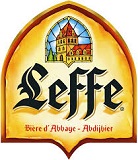
1152 On Jan. 10 Theobald II the Great (b. 1090) dies, and his eldest son Henry I (the Liberal) (1127-81) becomes count of Champagne, leaving his daddy's initially richer holdings in Blois, Chartres, Sancerre, and Chateaudun to his younger brothers, then going on to turn Champagne into the er, Champagne of French principalities, with some 2K reliable vassals, regular Champagne Fairs, and his court in Troyes a renowned intellectual center, home of Walter Map, Stephen of Alinerre et al. On Feb. 15 after making peace with the Welfs, Hohenstaufen German king Conrad III (b. 1093) dies, having never been crowned HRE; after allegedly naming him on his deathbed in preference to his 6-y.-o. son Frederick, and after seeing his chance (and putting his hand in his pockets and/or somebody's shorts?) on Mar. 4 his nephew Frederick (Ger. "peaceful ruler") I Barbarossa (Ger. "red beard") (1122-90) (who united the Hohenstaufen and Welf houses by marriage) is elected Hohenstaufen king #2 of Germany (until 1190), and crowned in Aachen on Mar. 9, hooking up with Pope Eugene III's envoys and threatening an invasion, which causes the Roman nobles to put down the Arnoldists; he proclaims the Great Imperial Landfrieden, creating an empire-wide martial law with special courts; his favorite hunting retreat is at Kaiserslautern in W Germany on the Lauter River. On Mar. 18 the 1137 marriage of 30-y.-o. Eleanor of Aquitaine (1122-1204) to Louis VII of France is annulled (officially due to lack of a male heir, but maybe because she had an affair during the Second Crusade?), and on May 18 she marries more plantworthy 19-y.-o. Henry Plantagenet (Curtmantle) (1133-89), Duke of Normandy and Count of Anjou, Maine, and Touraine (future Henry II), giving him control of over half of France with the power to pressure Louis' holdings from both N and S, causing Louis to feel that he has been robbed blind of her vast estates and cut off from direct access to the English Channel and the Atlantic, beginning a long struggle between England and France over Aquitaine (ends 1558); the Bordeaux and Graves areas of SW France on the left bank of the Garonne River between St. Pierre de Langon and Bordeaux in Guienne (Guyenne), known for their fine wines go to him, and the English upper class begin turning into claret (dry dark red wine) drinkers. On Apr. 6 English king Stephen I holds a council in London and makes his barons to homage to his unlikable son-heir Count Eustace IV of Bologne (1130-1153); too bad, the English bishops refuse to perform the coronation ceremony for this bad apple who had demanded contributions from religious houses in his war against the Angevins, and he luckily dies next Aug. while plundering Church lands, clearing the way for HP. In June 37-y.-o. Earl Henry (b. 1115) dies, leaving 70-something David I of Scotland without a male heir, and during the summer he takes Henry's 9-y.-o. 2nd son William (b. 1143) to Newcastle to be invested as earl of Northumberland while sending the eldest son Malcolm (b. 1141) on a progress around Scotland accompanied by Earl Duncan of Fife to secure his recognition as king-designate - Barney Fife jokes here? Baldwin III, Latin king of Jerusalem reaches the age of majority. The Byzantines under top-of-his-game Emperor Manuel I Comnenus defeat the Serbs, then begin a war with the Hungarians (ends 1156) after the latter attempt to take Serbia and Bosnia. After German intervention, Sweyn III is made "first king" of Denmark, with Canute V as 2nd king (until 1154). Emperor Manuel I's cousin Duke Andronicus I Comnenus tries to retake Mamistra from Toros II of Lesser Armenia with the help of rebel Armenian barons, but Toros defeats them in a surprise night raid. John FitzGilbert the Marshal is sieged at Newbury Castle by Stephen I, and promises to surrender but reneges, causing Stephen to threaten to kill his son William the Marshal, causing John to stink himself up by replying that he could make more sons and he can have him; luckily, Stephen changes his mind. Prince Yuri Dolgoruky founds Pereslavl-Zalessky in C Russia as the capital of Zalesye. The first independent archiepiscopacy in Norway is founded in Nidaros (Trondheim) (founded 997), which serves as the capital of Norway until 1217. The Synod of Kells (Kells-Mellifont) (successor to the 1111 Synod of Rath Breasail) ditches the system of hereditary lay abbots and establishes the diocesan system in Ireland, recognizes the primacy of Armagh and the archbishoprics of Cashel, Tuam, and Dublin, and begins tithing; Dublin changes from a diocese subject to Canterbury to a metropolitan archbishopric. The town of Kostroma is founded at the confluence of the Volga and Kostroma Rivers 216 mi. NNW from Moscow, becoming a commercial center. Norbertine Leffe Abbey is founded on the Meuse River in Namur, S Belgium, founding a brewery in 1240 and becoming known for their unique subtle ale Laeffe Blonde, becoming the first Abbey Beer; in 1952 it signs the first agreement between a Belgian abbey and a commercial brewery, Lootvoet Brewery in Overjise; in 1977 production is moved to the Stella Artois brewery in Leuven, which in 1988 becomes part of Interbrew. Architecture: The white limestone Cathedral of the Transfiguration in Pereslavl is begun (finished 1157). Music: Ladies' Strophes become the earliest German Minnelieder. Births: Spanish king of Aragon and count of Barcelona (1162-96) and poet Alfonso (Alfons) II (the Chaste) (the Troubadour) (d. 1196); son of Ramon Berenguer IV (1113-62) and Petronilla of Aragon (1135-74); brother of Ramon Berenguer III (1158-81); friend of Richard I Lionheart of England. Deaths: English scientist Adelard of Bath (b. 1080) in Bath. French count Theobald II of Champagne (b. 1090) on Jan. 10. German king (1138-52) Conrad III (b. 1093) on Feb. 15. English queen consort (wife of Stephen) Matilda (Maud) I of Bologne (b. 1105) on May 3 in Hedingham Castle, Essex; buried in Faversham Abbey. Scottish-English prince Henry of Scotland (b. 1114) in June. Italian Crusader Barisan (Balian the Elder) of Ibelin (b. ?) in N Italy (Sardinia?) (Chartres, France?); father of Balian of Ibelin (1141-93).




1153 In Jan. Henry Plantagenet comes to England with 30-40 ships to battle for the crown, landing at Malmesbury; on Nov. 6 the Treaty of Wallingford promises him the crown upon the death of Stephen I, who is allowed to rule until his death; all properties seized since 1135 are to be restored, and all castles built since 1135 are to be demolished. On May 24 king (since Apr. 1124) David I (b. 1180) dies at Carlisle, and his grandson (eldest son of Earl Henry of Huntingdon, who died in 1152) Malcolm IV (Mael Coluim mac Eanric) (the Maiden) (Virgo) (1141-65) becomes Canmore king of Scotland (until Dec. 9, 1965) (last to have a Gaelic name), which over the next four reigns consolidates itself and heads for a collision with the Norman English monarchy; meanwhile part-Norse Somerled (Somhairle) (Somhairlidh) (Norse "summer sailor") (-1164) of Argyll, his son Dubgall, and his nephew Donald Mac Malcolm rebel against Malcolm IV in favor of the Mac Alexander lineage (ends 1156); Malcolm IV is called the Maiden because of his eternal celibacy, modeled after Sir Galahad? On July 8 Pope (since 1145) Eugenius (Eugene) III dies, and on July 8 Corrado Demetri della Suburrra is elected Pope (#167) Anastasius IV (-1154), soon granting special privileges to the Hospitalers of St. John of Jerusalem, and restoring the Roman Pantheon. The Byzantines defeat the Hungarians. Seljuk sultan Masud I of Rum, incited by the Byzantines invades Lesser Armenia (Cilicia), and Seljuk sultan (since 1118) Ahmad Sanjar is captured by Oghuz Turks from Khuttal and Tukharistan, and held POW until 1156, sacking Nishapur and killing Shafi jurist Muhammad ibn Yahya; Toros II placates him by acknowledging him as overlord. After a 5-mo. siege Baldwin III of Jerusalem reconquers the funky ancient Philistine city of Ashkelon (Ascalon) on the Mediterranean coast from the Fatimids, annexing it to the County of Jaffa to form the County of Jaffa and Ascalon (until 1191). The Oghuz rebels capture Seljuk ruler Sanjar. The Kin Dynasty of the Tartar Golden Horde renames Nanking ("southern capital") (modern-day Beijing) to Chungtu ("middle capital"), located between the N capital of Mukden and the S capital of Kai Feng (until 1264). Parakramabahu I the Great (1123-86) becomes ruler of Ceylon (until 1186), with capital in Polonnaruwa, going on to unify the island. Olave I dies, and his son Godfred V of Man (-1187) succeeds as king of the Isle of Man and the Isles. Despite the opposition of her subjects, French-born Second Crusader Raynald (Reynald) (Reginald) of Chatillon (1125-87) marries princess (since 1130) Constance of Hauteville (1128-63), princess of Antioch, becoming prince of Antioch (until 1161). By this year the N African holdings of Roger II of Sicily reach their max. By this year Celtic churches in Scotland and Ireland finally merge into the Roman Catholic rite, leaving only some in N Wales (until 1172). Architecture: The Baptistery of St. John (Pisa Baptistry) in the Piazza dei Miracoli in Pisa (near the Leaning Tower) begins construction (finished 1363), becoming the largest baptistry in Italy, featuring a 190-ft.-high dome-crowned rotunda. Births: Roman Byzantine emperor #159 (1195-1203) Alexius III Angelus (Alexios III Angelos) (d. 1211); older brother of Alexius II Angelus (1155-1204). English knight (favorite of King John I) William de Braose, 4th Lord of Bramber, 3rd (7th) Baron Abergavenny (d. 1211) (b. 1144?) in Bamber, Sussex; husband of Maude de St. Valery (1155-1210); son of William de Braose II and Bertha de Gloucester; father of William de Braose, 4th Baron Abergavenny (1175-1210). English Norman knight Richard de Clare, 3rd Earl of Hertford, 6th Lord of Clare, 6th Lord of Tonbridge, 5th Lord of Cardigan (d. 1217) in Tunbridge Castle, Kent; son of Roger "the Good" de Clare, 2nd earl of Hertford (1116-73) and Maude St. Hillary; father of Gilbert de Clare, 4th earl of Gloucester (1180-1230) and Maud (Mathilde) de Clare (1184-1213). Deaths: English heir apparent Eustace IV, Count of Boulogne (b. 1130) in Aug. near Bury St. Edmonds, Norfolk; dies while plundering Church lands. Scottish king David I (b. 1180) on May 24 at Carlisle; buried in Dunfermline. Byzantine princess-historian Anna Comnena (b. 1083) in Constantinople; dies in the Monastery of Kecharitomene. French Cicesterian abbot (St.) Bernard of Clairvaux (b. 1090) on Aug. 21; dies after founding 163 monasteries in Europe.




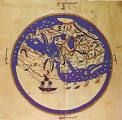
1154 In Jan. Thomas Becket (son of a prosperous London merchant) becomes Henry II's chancellor, Ralph Glanvill his chief justiciar, and Richard Fitz-Neal his treasurer; the great council meets and dismisses Stephen's Flemish mercenaries, and Henry begins revoking Stephen's royal grants. On Feb. 26 Roger II (b. 1095) dies, and his son (by 1st wife Elvira of Castile) William I (the Bad) of Sicily (1131-66) beccomes Norman king #2 of the Two Sicilies (until 1166); since he had three older brothers and they all died, he was raised without being prepared for rule, but lucks out by promoting well-educated art-loving chancellor Maio (Majone) of Bari (-1160) to #2 (adm.), who goes on to help him fight the pesky barons and independence-minded towns of their half-boot S kingdom in S Italy, and encourage immigration of Roman Catholics from W Europe; too bad, Pope Adrian IV refuses to recognize William I and excommunicates him, while crowning Frederick I Barbarossa king of Italy in Pavia, and sends an army to oust him, which is repulsed. The House of Plantagenet is planted, and England's first real king of the people takes power, bringing back the good government of his grandfather William the Conqueror and further centralizing its administration? In the sprig, er, spring Duke Henry Plantagenet returns to Normandy to a warm reception, and Louis VII renounces all rights to the duchy of Aquitaine; on Oct. 25 English king (since Dec. 22, 1135) Stephen I of Blois (b. 1096) dies in Dover, Kent, and on Dec. 19 Duke Henry returns to England and becomes Henry II Plantagenet (Fitzempress) (Curtmantle) (1133-89), (England's 25th monarch) (until July 6, 1189), ending the Norman and Blois Dynasties, and founding the Plantagenet (Angevin) Dynasty, which rules until 1399 (1485), immediately working to reestablish the royal institutions and curb the feudal privileges of the great baronial families, who had been benefiting from the so-called Anarchy; hairstyles begin to change in a flash, as men begin wearing their hair somewhat shorter; Normandy is back under English control (until 1204); the Angevin Empire extends from the Tweed River to the Pyreenes, combining England with the vast holdings of Eleanor (the entire W side and most of C France from Rouen down to Bayonne, including Normandy, Brittany, Maine, Anjou, Louraine, Poitou, La Marche, Aquitaine, Angoumois, Santonge, Perigord, Limousin, Auvergne, Agenais, Quercy, Rouergue, Gascony, and Bearn); the loser French king only rules the 50-mi.-wide French Royal Domain around and to the S of Paris, consisting of a few small territories passed down from Hugh Capet in 987, from Senlis on the N to Bourges on the S, and from Sens in the E to Orleans in the W; the remainder of France is in the hands of the counts of Flanders, Vermandois, Champagne, Blois, Bourbon, Toulouse, etc., and the duke of Burgundy; the Aug. 843 Partition (Treaty) of Verdun sets the boundary on the E; the old Spanish March of Charlemagne (Rousillon and Bigorre) in the Pyrenees owes nominal allegiance. On Dec. 3 Pope (since 1153) Anastasius IV dies, and on Dec. 4 Nicholas Breakspear is elected Pope (#168) Adrian (Hadrian) IV (1100-59) first English pope until ?) (his birth name would have to sound like Shakespeare and his papal name like the Antichrist?); he later utters the soundbyte that he wishes he never left England? On Apr. 17 after Yaroslav III of Kiev is driven out of Novgorod, Rostislav I (1110-67), prince of Smolensk (son of Mstislav I) becomes ruler of Novgorod; meanwhile grand prince (since 1151) Izyaslav II dies, causing Rostislav I to ditch them to become co-ruler of Kiev with his uncle Vyacheslav (until 1155), pissing-off the pop. of Novgorod, who drive out his son David and replace him with Yury Dolgoruky's son Mstislav Yirievich; after 1 week Izyaslav III Davidovich (1115-62) drives Roast Slab out of Kiev, and flees to Chernigov. Tyrannical too-pro-German Sweyn III of Denmark is overthrown by Canute V and Valdemar I after the latter turns against him. Masud I of Rum invades Cilicia again, but after a detachment sent into Antioch is ambushed by the Knights Templars at the Syrian Gates, they return to Rum. Ramon Berenguer IV absorbs the principality of Canfrac into his growing Aragonese empire. Emengol VI (b. 1096) dies, and his son Ermengol (Armengol) VII de Valencia (-1184) becomes count of Urgell in N Spain (until 1184). Turkish sultan Nureddin (Nur ad-Din) captures Damascus, ending the great Crusader dream, and unifies the Syrian interior. By this year Berber Almohad caliph al-Mumin rules Muslim Spain and part of Portugal. Yuri Dolgoruki founds Dmitrov (named after St. Demetrius) 40 mi. N of Moscow on the Yakhroma River at a site in the woods where his son was born. Nonfiction: The Anglo-Saxon Chronicle, kept by only one monastery, is discontinued this year - since who cares about the Anglo-Saxon dogs in England anymore? Mapmaker Al-Idrisi starts something big but doesn't know it? Abdu Abd Allah Mohammed (Muhammad) al-Idrisi (al-Idrissi) (1100-65), a Moroccan geographer in the service of Norman king Roger II of Sicily writes The Book of Roger, a geographical treatise based on Ptolemy with a Muslim Map of the World, showing S at the top, and inscribed on a silver sphere weighing 400 kg; he divides the Earth into seven climactic zones, and subdivides each zone into 10 parts, providing 70 detailed accurate maps; he claims that the Earth is spherical because an "equilibrium experiencing no variation" keeps it in balance; his map is later used by Columbus; a 2nd expanded ed. is pub. in 1161 titled "The Gardens of Humanity and the Amusement of the Soul" (now lost), followed by an abridged ed. in 1192 called "Little Idrisi". Caradoc of Llancarfan, Vitae Gildae. Births: Hungarian-Croatian queen consort (1172-84) Agnes (Anna) of Antioch (Chatillon) (d. 1184); daughter of Raynald of Chatillon, prince of Antioch (1125-87) and 1st wife Constance of Antioch (1127-63); first wife (1170-84) of Bela III (1148-96); mother of Margaret of Hungary (1175-1223); mother of Hungarian king Emeric (1174-1204), Byzantine empress Margaret of Hungary (1174-1224), Hungarian king Andrew II of Jerusalem (1177-1235), and Bohemian queen Constance of Hungary (1180-1240). Arab Muslim Sufi philosopher-theologian Shihab al-Din al-Suhrawardi (d. 1191). Portuguese king #2 (1185-1211) Sancho II (d. 1211); son of Alfonso I Henriques; father of Alfonso II (1186-1223). Russian grand prince of Vladimir (1177-1212) Vsevolod III Yuryevich (Yurievich) (the Big Nest) (d. 1212); father of Yaroslav II (1191-1246). Deaths: Norman Sicilian king (1130-54) king Roger II (b. 1095) on Feb. 26 in Palermo. English king (1135-54) Stephen I of Blois (b. 1096) on Oct. 25 in Dover, Kent.


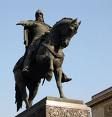
1155 A cattle plague strikes Ireland. On June 18 Frederick I Barbarossa is crowned HRE by Pope Adrian IV after an incident in Sutri on June 9 where he fails to kiss the pope's stirrup and is refused the kiss of peace until he does it over again right on June 11; a Roman army attacks them and is repulsed, but the new HRE leaves the pope to his foot, er, fate and withdraws from Italy. On Aug. 22 emperor (since Jan. 5, 1142) Konoe (b. 1139) dies without an heir, and on Aug. 23 retired emperor Toba's 4th son Go-Shirakawa (1127-92) (personal name Masahito) becomes Japanese Yamato emperor #77 (until Sept. 5, 1158). Arnold of Brescia (b. 1090) is hanged after being denounced - I like your jacket? William I's cousin Robert de Bassonville (1120-82) revolts and takes Bari with the help of a Byzantine army under Michael Palaeologus, and when William I falls sick in Sept.-Dec. 25 and leaves the kingdom to Maio of Bari and archbishop (since 1150) Hugh of Palermo (-1161), a revolt begins seeking to have them removed, but Maio gets out of it by having his #2 Asclettin imprisoned by the king. Raynald de Chatillon raids and plunders Cyprus, pissing-off Byzantine emperor Manuel I Comnemnus, who captures him in 1159 in Antioch, making him beg for mercy. The Byzantines grant trade privileges to Genoa to counteract Venice. English king Henry II abolishes fiscal earldoms and restores royal demesne; his choice of Thomas Becket as chancellor works out so well that Henry II feels free to go to the continent; having had the idea of conquering Ireland from the time of his accession, Henry II suggests an Irish expedition to the great council, but shelves the project for other business, then sends Norman brain man John of Salisbury to Pope Adrian IV to ask for lordship of Ireland; supervises the rebuilding of Westminster Abbey. After over a decade of sharing and sharing alike, Norwegian co-kings Inge I the Hunchback and Sigurd II meet in Bergen and fight, and Sigurd is killed, leaving only Inge and Eystein II as co-kings; now, like two scorpions in a bottle, only one can remain? Maredudd ap Gruffydd dies, and his brother Lord Rhys ap Gruffydd (1132-97) becomes king of the Welsh kingdom of Deheubarth (Welsh "Right-Hand Part" [South]) in S Wales. Grand prince (since 1139) Vyacheslav dies, and his younger brother Yuri (George) I Dolgoruky (Dolgoruki) (Long Arms) (1099-1157) overthrows his nephew Rostislav and declares himself grand prince of Kiev (until 1157), with capital at Suzdal in the E forest area again. Masud I of Rum unsuccessfully sieges Til Hamdoun (modern-day Toprakkale) in SE Anatolia. Taila III dies, and his son Someshvara IV (1183-1200) becomes Chalukya king of Kalyani in India, but is revolted against by a gen., who is assassinated by Basava (Basavanna) (1105-68), who goes on to found the Lingayat Sect of fanatical anti-Brahman phallic Siva worshipers, promising its adherents social equality; Someshvara IV waits in the wings (until 1183). After Duke Henry the Lion of Saxony wins some Vs against the pagan Slavic Obotrites in N Germany, Cistercian monk Berno (-1191) is installed as Roman Catholic bishop of Mecklenburg, taking on powerful pagan anti-German Slavic Obotrite (Obodrite) chief Niklot (1090-1160), who causes him to flee to German-filled Schwerin in 1158, after which he converts his son Prince Pribislav in 1163, pissing him off and causing him to flop his son back to paganism and make him prove his loyalty to daddy by making war against the Germans, almost killing the pesky German bishop at the altar. The city of Bristol in SW England 105 mi. W of London and 45 mi. E of Cardiff across the Severn River estuary from South Wales (modern-day pop. 463K/742K) receives a royal charter, going on to become one of the top three English cities by the 13th cent. after London and York, and granted county status in 1373; in modern times it has the 8th largest pop. in England. Architecture: Thomas Becket supervises the rebuilding of Westminster Abbey. Poetry: Robert Wace (1110-74) writes the 15K-line Norman French rhymed chronicle Roman de Brut (Brut d'Engleterre, Roman des Rois d'Angleterre, Geste des Bretons, Deeds of the Britons), a loose expanded translation of Geoffrey of Monmouth's 1136 History of the Kings of Britain, containing the first account of the Arthurian Legend. Births: English titular king (1170-83) Henry the Young King (d. 1183) on Feb 28; eldest son of Henry II and Eleanor of Aquitaine. Spanish king of Castile and Toledo (1158-1214) Alfonso VIII (the Noble) (d. 1214) on Nov. 11 in Soria; son of Sancho III of Castile (1134-58) and Blanche of Navarre (1134-56); grandson of Alfonso VII; husband of Eleanor of England (1161-1214) (daughter of Henry II and Eleanor of Aquitaine); father of Berengaria of Castile (1179-1246), Urraca of Castile (1186-1220), Blanche of Castile (1188-1252), Ferdinand of Castile (1189-1211), Henry I of Castile (1204-17), Eleanor of Castile (-1244). Sicilian king #3 (1166-89) William II (the Good) (d. 1189); son of William I the Bad (1131-66) and Margaret of Navarre (1128-83). French trouvere Blondel (Jean I/II) of Nesle (d. 1202) in Nesle, Picardy; companion of Richard I Lionheart of England. Latin emperor of Constantinople (1216-17) Peter II of Courtenay (d. 1218); son of Peter I of Courtenay (1126-83) (son of Louis VI of France) and Elisabeth de Courtenay; brother-in-law of Henry I of Flanders; husband of Yolande (daughter of John of Brienne); father of Robert I of Courtenay (-1228) and Baldwin II (1217-73). Bohemian king (1198-1230) Ottokar (Otakar) Premysl (d. 1230); younger son of Vladislav II (-1174); father of Wenceslaus I (1205-53). Chinese painter Ma Yuan (Ch'in-shan) (d. 1235) in Qiantang (Ch'ien-t'ang) (Hangzhou), Chekiang Province. Deaths: Italian monk-reformer Arnold of Brescia (b. 1090) (hanged). French scholastic philosopher William of Conches (b. 1090); leaves De Philosophia Mundi (4 vols), Dragmaticon Philosophiae, and Magna de Naturis Philosophia (lost). English anchoress-prioress Christina of Markyate (b. 1096); leaves Vita. English chronicler-bishop Geoffrey of Monmouth (b. 1100). Norwegian king Sigurd II (b. 1136) on Feb. 6 in Bergen. Japanese Yamato emperor #76 (1142-55) Konoe (b. 1139) on Aug. 22.


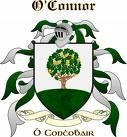



1156 In winter 1156/7 a great frost strikes Ireland, freezing the lakes. On Sept. 17 after reaching a compromise with the Welfs and marrying countess (since 148) Beatrice I of Burgundy (1143-84), heiress of Upper Burgundy, then making his cousin, Henry the Proud's son Henry the Lion (1129-95) the duke of Bavaria, HRE Frederick I Barbarossa issues the Privilegium Minus, making the margraviate of Austria a duchy and an inheritable fief of the House of Babenberg, with special privileges; former duke of Bavaria (since 1141) Henry (Heinrich) II Jasomirgott (1107-77) of the House of Babenberg becomes Austrian duke #1 (until 1177). The Byzantines win their war against the Hungarians (begun 1152) and make peace, with the Hungarians recognizing the emperor's suzerainty of Serbia and Bosnia. Want to conquer a neighbor in the Middle Ages? Try pope in a pocket? Norman philosopher-historian (pupil of Peter Abelard) John of Salisbury (1115-80) obtains from Pope Adrian IV the bull Laudabiliter ("It is praiseworthy"), AKA the Donation of Ireland, bestowing Ireland on English king (since 1154) Henry II of England (1133-89), along with a ring as the symbol of his investiture; meanwhile Henry II captures Anjou in France. After the papal forces are defeated, the Treaty of Benevento ends the war between Norman Sicily and Pope Adrian IV, compelling him to recognize William I's title in Sicily, Apulia, Naples, Amalfi, and Salerno, while allying the papacy with the Normans and granting the pope some territories claimed by Frederick I Barbarossa, causing him to turn against William I. Masud I dies, and his son Kilij Arslan ("Lion Sword") II (-1192) becomes Seljuk sultan of Rum (until 1192). The Mac Alexander revolt in Scotland (begun 1153) ends with the capture of Donald Mac Malcolm, who is imprisoned with his daddy Malcolm at Roxburgh; Somerled heads to the Scottish isles with his son, and, although he is part Norse claims to descend from Irish Gaelic kings in the Hebrides dating back to the 7th cent., sees his chance and decides to take Argyll and the Hebrides from the new Norse king (since 1153) Godfred V, and defeats him with his 80 ships, and they agree to split the Manx kingdom, with Godfred getting the part N of Ardnamurchan and Somerled getting the S part; Godfred rules over Dublin for a short time also. High king (since 1120( Turlough Mor O'Connor (b. 1088) dies, and his son Rory O'Connor (Ruaidri mac Tairrdelbach Ua Conchobair) (1116-98) becomes Ard Ri (high king) of Connacht in W Ireland, followed in 1166 by Ireland's last high king before the Norman invasion. Nantes rebels against its count Hoel III of Cornwall and drives him from the country, and he dies in the Cistercian abbey of Melleray; meanwhile Conan IV the Young of Penthievre (1138-71), son of Alan the Black of Penthievre of Brittany, 1st Earl of Richmond, 1st Earl of Cornwall (1095-1146) and Bertha of Brittany (daughter of Duke Conan III of Brittany) overthrows his stepfather Eudes, becoming duke of Brittany (until 1171). Demetre I (b. 1093) dies after surviving a coup by his son David two years earlier, which is ended with his son's death after 6 mo., and his other son George (Giorgi) III (-1184) becomes king of Georgia (until 1184), going back on the offensive against the Seljuk Khlat sultanate in Armenia. Prince Yuri Dolgoruky (Dolgoruki) (Long Limbs) orders a fort built on the hill overlooking the Moscow River, known as the Kremlin, which later grows into Moscow (Moskva). German HRE (1155-90) Frederick I Barbarossa (1122-90) pub. Justitia civitatis Augustensis for Augsburg, the first city law code, containing regulations for brewers; "A brewer who makes bad beer or pours an unjust measure shall be punished; his beer shall be destroyed or distributed at no charge among the poor"; the fine for a violation is five guilders; after a 3rd offense the perpetrator loses his brewing license. Architecture: The Mermaid Inn in Rye, East Sussex on the S coast of England is founded, making Rye famous; it is rebuilt in 1420. Nur-ud-din founds the Al-Walid Hospital (Bimaristan) in Damascus, which gives free treatment incl. drugs for 267 years (until 1427). Births: Roman Byzantine emperor #158 (1185-95, 1203-4) Isaac II Angelus (Isaaco II Angelos) (d. 1204) in Sept.; younger brother of Alexius III Angelus (1153-1211). French count of Toulouse and marquis of Provence (1194-1222) Raymond VI (d. 1222) on Oct. 27 in Saint-Gilles, Gard; son of Raymond V (1134-94) and Constance of France (1124-76), only daughter of Louis VI and 2nd wife Adelaide de Maurienne; maternal nephew of Louis VII. English archbishop of Canterbury (1207-15, 1218-28) Stephen Langton (d. 1228); first signer of the 1215 Magna Charta. Deaths: Irish high king (1120-56) Turlough Mor O'Connor (b. 1088) in Dunmore, County Galway. Georgian king (1125-56) Demetre I (b. 1093). Japanese Yamato emperor #74 (1107-23) Toba (b. 1103) on July 20.
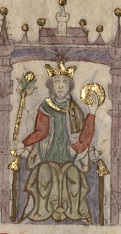
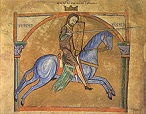



1157 On May 8 sultan (since 1118) Ahmad Sanjar (b. 1085) dies after escaping from the Oghuz Turks, becoming the longest-reigning Muslim ruler until the arrival of the Mongols, and Il-Arslan ("The Lion") (-1172) declares his independence, becoming sultan (until 1172) and founding the Khwarezmshah (Khorezmshah) (Khwarazmian) (Khwarezmid) Dynasty in E and C Persia (ends 1231), later conquering Afghanistan and Transoxania; the Seljuk Empire (founded 1037) collapses, with the runt dynasty only controlling Iraq and Azerbaijan. On Aug. 21 king (since 1126) Alfonso VII of Castile and Leon (b. 1105) dies, leaving Castile and Toledo to his desired son Sancho III (the Desired) (1134-58) (until Aug. 31, 1158), and Leon and Galicia to his son Ferdinand II (1137-88) (until Jan. 22, 1188); Sancho III goes on to found the Order of Calatrava, the first military order in Castile, which is confirmed via a bull by Pope Alexander III on Sept. 26, 1164; Ferdinand II goes on in 1170 to found the Order of Santiago de Compostela to protect the city of Caceres. The Almohads take Almeria from the Genoese. The term "Holy Empire" is first used by HRE Frederick I Barbarossa to give his job a more sanctified sound, probably to break the mental deadlock, because by now the jig is up about it having anything to do with making the pope the emperor of the Western world, or making a secular ruler the emperor of a Universal Catholic Nation Under God where the pope calls the shots; "Neither Holy, nor Roman, nor an Empire" (Voltaire). English king Henry II reneges on his 1149 promises and lays claim to Northumberland, Cumberland, and Westmoreland, and Scottish king Malcolm IV caves in, accepting the restoration of Huntington and becoming Henry's vassal; 14-y.-o. William, earl of Northumberland is disinherited, causing him to grow bitter even though Henry II tries to compensate him with Tynedale, and after he becomes king in 1165 he spends 20 years trying to regain it, ending up as his big humiliation. Norwegian co-kings Inge I "the Hunchback" (b. 1135) and old fart Eystein II (b. 1125) duke it out near Moster on the W coast, and Eystein II loses, fleeing to Bohuslan in W Sweden before being killed later in the year, leaving Inge I as sole king; too bad, Sigurd II's 10-y.-o. son Haakon II Herdebrei "Broad-Shouldered" (1147-62) (uncle of Eystein) takes him on, keeping the endless Norwegian civil war (begun 1130) going strong - the weather gives them all a brain freeze? Eric IX of Sweden leads a Christian crusade and conquers pagan Finland, then leaves the bishop of Uppsala in charge of conversion work; Finland becomes a part of Sweden (until 1710). HRE Frederick I Barbarossa intervenes in the Polish war with the Germans and forces the submission of Boleslav IV the Curly of Poland. Stephen of Armenia begins raiding Byzantine territories around Marash (modern-day Kahramanmaras) in S Turkey, pissing-off his half-brother Toros II, who doesn't want the Byzantines to come after him. Yuri I Dolgoruky (b. 1099) dies, and his son (St.) Andrei (Andrey) (Andrew) I Bogolyubsky (Bogoliubski) ("God-loving") (1111-74) becomes prince of Suzdal (until 1174), repressing the pesky boyars (nobles), and establishing his capital at Vladimir (Russ. "great ruler") near Moscow (founded 1108); he also completes the construction of the Cathedral of the Transfiguration, and builds strong walls and a Golden Gate like the one at Kiev; the flow of people from Cuman-plagued Kiev to the NE into the land of the Finns around the Oka River and Upper Volga River (whose source is in the Valdai Hills) causes a major pop. shift in Russia, causing Kiev to go downhill and Vladimir and Moscow to go uphill. Exiled Danish king Sweyn III (b. 1125) is restored with German help, ending the Danish civil war (begun 1147); the kingdom is split, with Sweyn getting Scania (S Sweden), Valdemar I "the Great" (1131-82) getting Jutland, and Canute V getting the rest; Sweyn then invites the other two to the Bloodfeast at Roskilde on Sjaellen Island W of Copenhagen, and tries to give himself a promotion; Canute is killed, but Valdemar escapes to Jutland, and on Oct. 23 he defeats and kills Sweyn at the Battle of Grathe Heath near Viborg, becoming sole king of Denmark (until 1182); finding his kingdom overrun by the Wends, Valdemar allies with Henry the Lion of Saxony and Albert the Bear of Brandenburg against them, and this time they succeed in subjugating and Christianizing them (by 1180). King Rhys of Deheubarth submits to Henry II, drops the title of king and becomes known as Lord Rhys - Lord Vader? Kalachuri Bijala II captures the Western Chalukya capital of Kalyani, causing Tailapa III to flee to Annigerii before being KIA by Hoysala Viranarasimha in 1162. A fire in Lubeck (Lübeck) causes the city to be refounded, and in 1159 it is rebuilt in brick. The first govt. bonds are issued by Venice. Births: English scholar Alexander Neckam (Necham) (Nequam) (d. 1217) on Sept. 8 in St. Albans, Hertfordshire; born the same night as Richard I, and nursed together, becoming his foster brother; educated at St. Albans Abbey. English king #26 (1189-99) (strawberry blonde) Richard (OG "strong ruler", "powerful leader") I Coeur de Lion (the Lionhearted) (Lionheart) Plantagenet (d. 1199) on Sept. 8 in Beaumont Palace, Oxford; 3rd son of Henry II (1133-89) and Eleanor of Aquitaine (1122-1204); brother of Henry the Young King (1155-83), Duke Geoffrey II of Brittany (1158-86), Leonora of Castile (1162-1214), Queen Joan of Sicily (1165-99), and John I (1166-1216); speaks only French; mommy liked him best? Norwegian king #1 (1061-84) Magnus V Erlingsson (d. 1184) in Etne, Hordaland; son of Erling Skakke and Kristin Sirurdsdatter (daughter of Sigurd Jorsalfare). Austrian duke (1177-94) and Styrian duke (1192-4) Leopold V (the Virtuous) (d. 1194); son of Henry II Jasomirgott (1107-77) and Theodora Comnena (-1184) (daughter of Andronicus Comnenus, 2nd son of Byzantine emperor John II Comnenos); father of Frederick I (1175-1198) and Leopold VI (1176-1230). Deaths: Seljuk sultan of Khorasan (1097-1118) Ahmad Sanjar (b. 1085) on May 8 in Marv. Jewish Rabbi Abraham ibn Ezra (b. 1092); leaves works on combinatorial analysis; subject of the poem Rabbi Ben Ezra by Robert Browning. Russian Kievan grand prince (1149-51, 1155-7) Yuri I Dolgoruky (b. 1099). Spanish king of Castile-Leon (1126-57) Alfonso VII the Emperor (b. 1105) on Aug. 21 in Sierra Morena. Norwegian king (1142-57) Eystein II (b. 1125) in Bohuslan, W Sweden. Danish king Sweyn III (b. 1125) on Oct. 23.

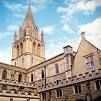
1158 On Aug. 31 king (since Aug. 21, 1157) Sancho III (b. 1134) dies, and his son Alfonso VIII (the Noble) (1155-1214) becomes king of Castile and Toledo (until Oct. 5, 1214), going on to take on the Almohads and break their back in the 1212 Battle of las Navas de Tolosa. On Sept. 5 emperor (since Sept. 5, 1158) Nijo (1143-65) falls ill and abdicates in favor of his infant son Rokujo (1164-76), who becomes Japanese Yamato emperor #79 (until Apr. 9, 1168); Nijo dies on Sept. 5. The Byzantine war with Norman Roger II of Sicily (begun 1147) ends with an inconclusive peace, allowing Emperor Manuel I to launch an expedition against Raymond of Antioch (ends 1159). Frederick I Barbarossa with Bohemian aid captures Milan, and convenes the Diet of Roncaglia, demanding absolutist control of the Lombard cities and installing podestas (imperial reps) in the cities; Pope Adrian IV demands that he recognize his independence in Rome, causing Frederick I to try to drive him out, after which popey back the Lombards; Frederick I rewards Vladislav II of Bohemia by awarding him a hereditary crown. The city of Munich (Munchen) (Ger. "Munichen" = "by the monks") (modern-day pop. 1.45M/2.6M) on the Isar River N of the Bavarian Alps in Bavaria in SE West Germany is first mentioned after being founded by Duke Henry the Lion on the site of an old Benedictine monastery, becoming the center of the salt trade and going on to become the most populous city in Bavaria and 3rd largest city in Germany after Berlin and Hamburg - the birthplace of the Nazi movement in 1923? Count Geoffrey of Nantes dies, and Duke Conan IV of Brittany seizes Nantes, pissing-off Geoffrey's brother Henry II of England, who seizes his earldom of Richmond, after which they make up in 1160 with Conan marrying Henry's cousin Margaret of Scotland. Somerled invades the Isle of Man with 53 ships, defeats Godfred V and forces him to flee to Norway, making Somerled the first Gaelic Lord of the Isles (until 1164), from the Isle of Man to the Butt of Lewis - erin go bragh? Morgan ap Owain is killed by Ifor Bach, and is succeded as lord of Caerleon by his brother Iorwerth ap Owain Wan (untl Sept. 1171). English chancellor (since Jan. 1155) (St.) Thomas Becket (1119-70) travels to France as the English ambassador, taking with him a present of iron-bound casks of beer, only to find out that the French have an extensive brewing industry of their own, becoming the first cross-Channel beer shipment? Architecture: Christ Church Cathedral in Oxford, England is begun (finished in 1200). St. Andrews Cathedral in St. Andrews, Fife, Scotland is begun by Bishop Robert of Scone (1122-59); it is dedicated in 1318. Nonfiction: Moses Maimonides (1135-1204), Book of the Lamp (Kitab al-Siraj); a commentary on the Mishna that establishes him as a star in the Jewish community. Births: Arab Abbasid caliph (1180-1225) Al-Nasir li-Din Allah (d. 1225) on Aug. 6; son of Caliph Al-Mustadi and Zumurrud (Emerald). French-English duke of Brittany (1181-6) Geoffrey II Plantagenet, Duke of Brittany and 3rd Earl of Richmond (d. 1186) on Sept. 23; 4th of five sons of Henry II of England and Eleanor of Acquitaine. Spanish count of Provence (1173-81) Ramon Berenguer III (d. 1181); 2nd son of Ramon Berenguer IV (1113-62) and Petronilla of Aragon (1135-74); brother of Alfonso II of Aragon (1152-96) and Sancho of Provence (1161-1223). Deaths: German bishop (1138-58) Otto of Freising (b. 1114) on Sept. 22 in Morimond, Champagne; leaves unfinished Gesta Friderici I Imperatoris (The Deeds of Emperor Frederick I) (2 vols.), covering from the quarrel between HRE Henry IV and Pope Gregory VI to the death of Conrad III in 1152, incl. Bernard of Clairvaux and Pierre Abeldard, along with the 1152 election of Frederick I and the first five years of his reign esp. in Italy, ending in 1156, which is finished by his chaplain Ragewin (Rahewin); it paints Barbarossa as a hero whose accession to the throne brought and end to the Church-State conflict, bringing the Heavenly City of St. Augustine to reality. Spanish king of Castile and Toledo (1157-8) Sancho II (b. 1134) on Aug. 31 in Toledo.
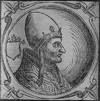


1159 On Sept. 1 after giving a speech threatening HRE Frederick I with excommunication, Pope (since Dec. 4, 1154) Adrian IV takes a drink in a fountain, and a fly entered his mouth and stuck in his throat, choking him to death, and on Sept. 7 Laurentius (Orlando) (Roland) Bandinelli of Siena is elected Pope #169 Alexander III (1100-81) (until Aug. 30, 1181) (one of the ablest popes) by all but 4-5 of the 22 cardinals, but on Sept. 7 Frederick I's cardinals (the rest) chooses Octavian (Octavianus) as Antipope Victor IV (1095-1164) (until Apr. 20, 1164); Alexander III is friendly with the Jews and employs one to manage his finances; when he goes on to try to enforce the ban on clerical mistresses, but when he selects monk Clernbald for archbishop of Canterbury he finds he has had 17 illegitimate kids in one village alone?; meanwhile Alexander III offers Rory (Roderick) (Gael. "high longing") O'Connor (Ruaidri Ua Conchobair) (1116-98) the kingship of Ireland if he will give up all but one of his six wives, and he says forget it? An English army led by Thomas Becket invades Toulouse to assert the rights of Eleanor, but Louis VII drives them off; Malcolm IV and his younger brother William obey a summons to give service in Toulouse, and on June 30 Henry knights Malcolm in Perigueux, which turns him on because his daddy David had taught him that knighthood was the ultimate high, and Malcolm then knights William, but the whole idea of kissing English butt pisses-off the Gaelic nobles, who attempt to seize him at Perth when he returns, but are defeated and forced to submit; Malcolm then invades Galloway and defeats its ruler Fergus and forces him into retirement as a canon in Holyrood Abbey, and partitions his lands between Fergus' sons; this proves that even though Malcolm is called the Maiden for his unpopped cherry he's no whimp with a shield and lance, and also cements William's love of Frankish chivalry, causing him to call himself William de Warenne to emphasize his mother's Anglo-Norman heritage and snub his daddy's royal Scottish heritage? The Almohads conquer Tunis. Greek Byzantine emperor Manuel I kicks Raymond of Antioch's butt and forces him to renew his homage, then negotiates with Nur ad-Din in Syria; on his return he is attacked by Kilij Arslan II of Rum as he passes his capital of Konya (Iconium) - I like that old time rock 'n' roll? German traders begin visiting Riga, bringing Augustinian monk (St.) Meinhard of Segeberg (-1196) to convert the pagan Finnic Livs; in 1186 he is made the first bishop of Livonia by Bremen prince-archbishop (1185-1207) Hartwig of Uthlede (-1207) at Ikskile (Uxkull); too bad, he dies without converting them. Th N German town of Lubeck (Lübeck) on an island enclosed by the Trave River (modern-day pop. 216K) is rebuilt by Henry the Lion, duke of Saxony and Bavaria, becoming a free imperial city in 1227, and forming an alliance in 1241 with Hamburg, which became an imperial city in 1189; in 1356 the Hanseatic League holds its first gen. diet in Lubeck, growing to 170 cities and dominating Baltic maritime trade until 1800, incl. beer. Nonfiction: Peter Lombard (1096-1160), Sententiae Libri IV (Four Books of Opinions); his magnum opus; authoritative statements on Biblical passages, which founds formal Scholastic Philosophy (Scholasticism), an attempt to reconcile reason and faith in the face of growing numbers of skeptics and atheists; a compilation of the thought of Peter Abelard, it is an attempt to solve all theological and philosophical problems, dissing reason for the authority of the Bible, becoming the std. text in Paris for the next four cents., with 4K+ commentaries getting written on it, holding back the advance of rationalism for the next half-cent. until the arrival of Aristotle's works in Latin; Roger Bacon says that it has displaced the Bible itself; identifies charity with the Holy Spirit, and considers marriage as a consensual union that need not be consummated to be perfect. John of Salisbury (1115-80), Policraticus; "the first attempt in the Middle Ages at an extended and systematic treatment of political philosophy" (G.H. Sabine); argues for the overthrow of tyrants and in favor of limited monarchy, later spawning the Magna Charta of 1215; society is a creature, with the king as the head, the Church as the soul, the govs. and judges as the ears and the eyes, the soldiers as the hands, and farmers as the feet? Deaths: Polish king (1138-46) Ladislaus (Wladyslaw) II the Exile (b. 1105) on May 30 in Altenburg. Norman count (of Boulogne) William I of Blois (b. 1137) on Oct. 11.